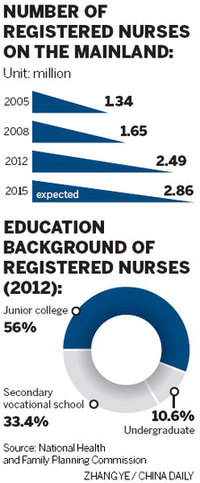Moving overseas a job remedy for nurses
Updated: 2013-05-13 07:29
By Wang Qingyun and Shan Juan (China Daily)
|
||||||||

Many give up their careers in China because of low pay and few benefits
Nurse Song Yan would have sought a job in another country if not for her family and child.
"I work at least nine hours a day and overtime from time to time, and get meager pay," said the veteran nurse who has practiced the profession for at least 20 years.
"The working environment here is noisy, crowded and sometimes even chaotic," said Song, a senior nurse at the chest surgery department of Xuanwu Hospital Capital Medical University in Beijing.
For young nurses, the work is even tougher. "They usually have to work extra to gain patients' trust," she noted.
Many simply give up.
In some big departments with about 100 nurses, about 10 quit each year because the job is so physically and mentally demanding.
Some, usually younger ones, who have good command of a foreign language, have begun to go abroad for a decently paid nursing job, she said. "I have a family and a child to take care of, otherwise I'd also like to go."
Countries like Singapore, Japan and Saudi Arabia have begun to tap other countries for competent nurses because they cannot produce enough of their own to meet needs.
Singapore's healthcare system is expected to recruit about 1,000 to 2,000 foreign nurses annually to meet rising demand for healthcare prompted by a rapidly ageing population and China has become an outsourcing site of rising importance.
According to Lou Qinghong, manager of the Sino-US International Nurse Training Company, Chinese nurses are "newcomers" compared with nurses from English speaking countries such as the Philippines, Malaysia and India, which have been the first choices for international employers.
The agency based in Beijing helps train Chinese nurses for employers in other countries.
"Finding jobs abroad is becoming popular among Chinese nurses. Many nursing schools have opened English nursing courses, and many training agencies like us are promoting programs for Chinese nurses to work abroad," he said.
"Back when we started the business in 2005, we saw US employers come to Beijing to interview nurses and promise to help them and their family members get green cards as long as the nurse meets the qualifications to work there," Lou noted.
The frenzy declined after 2009, when the United States stopped issuing employment visas for foreign nurses whose academic qualifications were lower than a bachelor's degree, but Lou emphasized his agency's business is "stable" since the demand by hospitals in other countries such as Singapore and Saudi Arabia remains strong.

 Michelle lays roses at site along Berlin Wall
Michelle lays roses at site along Berlin Wall
 Historic space lecture in Tiangong-1 commences
Historic space lecture in Tiangong-1 commences
 'Sopranos' Star James Gandolfini dead at 51
'Sopranos' Star James Gandolfini dead at 51
 UN: Number of refugees hits 18-year high
UN: Number of refugees hits 18-year high
 Slide: Jet exercises from aircraft carrier
Slide: Jet exercises from aircraft carrier
 Talks establish fishery hotline
Talks establish fishery hotline
 Foreign buyers eye Chinese drones
Foreign buyers eye Chinese drones
 UN chief hails China's peacekeepers
UN chief hails China's peacekeepers
Most Viewed
Editor's Picks

|

|

|

|

|

|
Today's Top News
Shenzhou X astronaut gives lecture today
US told to reassess duties on Chinese paper
Chinese seek greater share of satellite market
Russia rejects Obama's nuke cut proposal
US immigration bill sees Senate breakthrough
Brazilian cities revoke fare hikes
Moody's warns on China's local govt debt
Air quality in major cities drops in May
US Weekly

|

|







